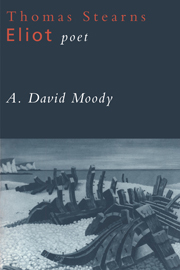Book contents
- Frontmatter
- Contents
- Acknowledgments
- Preface to second edition
- Introduction
- 1 The growth of the poet's mind
- PART ONE 1905–1912 – AN INDIVIDUAL TALENT
- Oxford University Extension Lectures
- PART TWO 1912–1922 – ‘SHALL I AT LEAST SET MY LANDS IN ORDER?’
- PART THREE 1922–1930 – ‘ORDINA QUEST’ AMORE, O TU CHE M' AMI'
- PART FOUR 1931–1939 – THE WORD IN THE DESERT
- PART FIVE 1939–1945 – APOCALYPSE
- AFTERWORDS
- APPENDICES
- Notes
- Index
Introduction
Published online by Cambridge University Press: 05 February 2012
- Frontmatter
- Contents
- Acknowledgments
- Preface to second edition
- Introduction
- 1 The growth of the poet's mind
- PART ONE 1905–1912 – AN INDIVIDUAL TALENT
- Oxford University Extension Lectures
- PART TWO 1912–1922 – ‘SHALL I AT LEAST SET MY LANDS IN ORDER?’
- PART THREE 1922–1930 – ‘ORDINA QUEST’ AMORE, O TU CHE M' AMI'
- PART FOUR 1931–1939 – THE WORD IN THE DESERT
- PART FIVE 1939–1945 – APOCALYPSE
- AFTERWORDS
- APPENDICES
- Notes
- Index
Summary
The ‘Thomas Stearns Eliot’ of my title is a collection of writings, and the ‘Poet’ is the author within his poems. For his readers Eliot now is an oeuvre, just as Shakespeare is. Of course we do know something of the man he was, and more is bound to come out; but the value of such knowledge is rather like that of knowing, when reading Homer, that Troy actually existed. Poetry, Aristotle said, is more philosophical than history – or than biography, we may add: seeking ‘the universal’ in the particular event, it tells the story differently, or it can tell another story altogether. Eliot's poetry is made up out of what the man lived through; but the poet we come to know in it is an elected self, a personality deliberately fashioned in the medium of language, and whose only real existence is in the poetry. This is not to say that the poet has no relation to life. On the contrary, being detached from the private and particular experience of one man, he becomes like the hero of a drama, one who outstandingly represents – and perhaps carries to excess – something characteristic of other lives and times beside his own.
There is a good introduction to Eliot's poetry in his ‘Brief Introduction to the Method of Paul Valéry’.
- Type
- Chapter
- Information
- Thomas Stearns Eliot: Poet , pp. xvii - xxiiPublisher: Cambridge University PressPrint publication year: 1995



